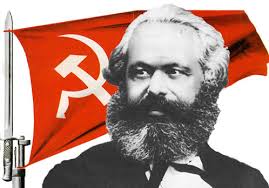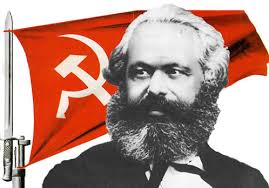
It’s 200 years after the birth of Karl Marx, and nearly 30 years after the overthrow of The Soviet Union and the declared “end of history”, but yet the name of Karl Marx can’t seem to wither away out of society; despite constant attempts by the bourgeoisie the world over. So much so has this withering of Marx and his ideas not been the case, that today we would be hard pressed to find a mainstream media outlet who has not been forced to examine the legacy , life and teachings of Marx within their pages and platforms – whether in an affirmative or a negative framework. The fact is that 200 years after the birth of Karl Marx, Marxism and Communism / Communist ideals are alive and well, growing rapidly in western capitalist countries, and like it or not cannot be ignored by the ruling class who would much prefer Marx be relegated to the dustbin of history – a place where capitalism and a bourgeois ruling class are quickly heading.
With large sections of the world still openly declaring a dedication to Marxism it seems relevant to examine what were Marx’s ideas and how do they relate to us today? How can they help us to understand the conditions of today? How, if at all, can they help us to move forward out of parasitic capitalism toward a socialist society?
What were the ideas of Marx? Marx wrote in a time when capitalism was establishing itself in the world and was very much in it’s infancy. Marx recognized the way industrialization was quickly transforming the landscape of both capitalism and labour. With industrial capitalism came the large socialization of labour. This created the dynamic of a socialized and socially conscious labour force coupled with the private appropriation of the finished product, not by the workers who produced the product, but by the capitalist owner(s). This process of production results in multiple ramifications that can have no alternative but to polarize society into two growing and ever more consolidated camps. Those who own the means of production – the capitalists – and those who own nothing but the ability to sell their labour for subsistence – the working class.
Marx explained that through this division of society into various classes based on the division of labour , multiple instances would arise. He explained the idea of alienation. Alienation from ones labour and the products there-of, but also alienation between man and himself. The capitalists, paying mere subsistence wages – that is wages in the amount deemed necessary to reproduce the ability for the wage-slave to return to work the following day, but as little more than this as possible – aim to keep the working class toiling for as many hours per day as possible, coupled with the increase in technological advancement that reduces the actual labour of working men and women to mere cogs or parts in a much larger machine. The result is that the worker has absolutely no relation to his / her labour, no relation to the finished product, and no time left in the day after working to ensure their survival, to explore or embrace the true creative nature that makes a worker a human being. Thus we have the complete alienation of the worker from their labour and themselves.
Marx also went further and undertook the monumental task of not only understanding, but dissecting and illustrating the mechanics of the system of capitalism itself. By examining the various parts of capitalism, from private property, to commodities, to wages, to labour itself, Marx attempted to provide us with a way to grasp that which has its boot on the necks of the masses of workers so that we may understand the nature of our exploitation and the bankruptcy of things like appeals to morality and fairness on the part of the capitalists and ruling class. Marx showed ( largely in Capital, but also in The Communist Manifesto and especially Value, Price and Profit ) that the nature of capitalists and capitalism is to accumulate capital and profit. Where does profit come from? asks Marx. To which he explains the theory of “surplus-value of labour”. Marx explains that the value of labour power is not equal to the value of wages paid to the worker for his/her days wage, but that in fact the wage of the worker is merely the amount required to meet subsistence for the worker to ensure their ability to return to work the following day. So let’s say for example that a work day is 12 hours, and that the cost of subsistence requires only 6 hours of labour. That means that the wage paid to the worker for a 12 hour day, being only equal to the output of 6 hours of labour is not and cannot be the total value of labour output by the worker because the worker is producing another 6 hours worth of labour value above the 6 hours required to pay his / her wage for the 12 hour day. The other 6 hours of labour power – for which the worker is not paid – is the surplus value, or the profit pocketed by the capitalist – who has done none of the work to produce the goods – and is an unnecessary aspect of the production process . Marx predicted that this process and this division of labour would not only polarize the two growing classes of society – proletariat and bourgeoisie – in ever increasing and antagonistic ways, but would also lead to a monumental centralization of capital and means of production into fewer and fewer hands.
Marx recognized through his entire life that this dynamic, this capitalist society could result in only one outcome; the revolutionary struggle between the masses of the working class and the capitalist ruling class. Marx recognized and maintained throughout his life that only revolution could emancipate the working class from the bonds of wage-slavery. Only a working class revolution could eliminate the oppressive fetters of capitalism.
Since the death of Marx, it would be foolish to ignore the accuracy with which he was able to determine the trajectory of capitalism into monopoly capitalism and imperialism. It would also be foolish to ignore the inspiration that Marx has been and is to hundreds of millions of proletarian revolutionaries throughout the years, who armed with the understandings and science of Marxism were able to liberate themselves, through revolution, from the yoke of capitalist oppression; and the hundreds of millions more currently engaged in that revolutionary struggle.
It’s been 200 years since the birth of Karl Marx. Half the worlds wealth is concentrated into the hands of 8 people. Imperialism is as ferocious as ever in it’s attempts to dominate and control various strategic geographic and resource rich areas at the expense of millions of working class people. Massive debt and unemployment rock the most established capitalist countries, resulting in ever more fascistic tendencies. Automation and robotics under capitalism threatens to once again reshape the division of labour – and labour itself – in society. The world as a whole is more consolidated, more polarized, more disenfranchised, more alienated and more restless; and more aware. Is it any wonder that 200 years later the bourgeois class and their mouthpieces in mainstream media are forced to contend with the growing wave of Marxism and Communism? Is it any wonder that in the US – that bastion of capitalism – over 50% of people under 30 prefer Socialism to Capitalism?
Clearly there is a specter haunting capitalism. The specter of Communism. The specter of working class, proletarian revolution.
Karl Marx was not a prophet. He was not a messiah. He was not even always right. But he was a Communist and a Comrade. He applied Historical and Material Dialectics – a process through which the starting point of any premise begins with the human actor and his/her material conditions and the dialectic method of recognizing the contradictory and antagonistic unity of opposites propelling all things forward in an evolutionary manner – in an explosive and exposing way to display in bare and naked truth the reality of the current epoch – that of capitalism and proletarian revolution. Through this method and this approach, Marx left us with an invaluable ability to correctly understand the world around us, the trajectory we are heading, the foundational mechanics that govern society, the ability to perceive alternatives, and the inspiration and understanding of revolutionary action being the bare minimum required in order to move past the parasitic system of capitalism.
200 years later and here we are, bombarded with articles in the mainstream verifying that “failure” of Marxism in an attempt to shield themselves from the rising tide of working class retribution, and here we are 200 years later, wishing Marx a happy birthday and recognizing that “the ruling classes tremble at the thought of a communistic revolution”.
“In short, the Communists everywhere support every revolutionary movement against the existing social and political order of things.
In all these movements, they bring to the front, as the leading question in each, the property question, no matter what its degree of development at the time. …
The Communists disdain to conceal their views and aims. They openly declare that their ends can be attained only by the forcible overthrow of all existing social conditions. Let the ruling classes tremble at a Communistic revolution. The proletarians have nothing to lose but their chains. They have a world to win. “ – The Communist Manifesto
A Communist Canada

